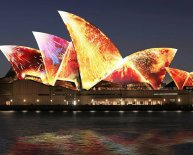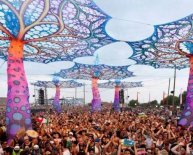
Australian Festivals and celebrations
As festivals and celebrations are common topics in the IELTS Test, it's a good idea prepare to talk about a major festival in your country or the way weddings and birthdays are celebrated. In the video, study notes and activities for this episode we'll discuss what to say when you talk about festivals and celebrations.
Transcript
Hello, and welcome to Study English, IELTS preparation. I’m Margot Politis.
A common topic in the IELTS test is festivals and celebrations.
It’s a good idea to be prepared to talk about a major festival in your country or the way weddings and birthdays are celebrated.
By festivals, we mean things such as Chinese New year or Christmas or the Water Festival. How does our speaker talk about the Water Festival?
The Water Festival is one of the most popular festivals in Cambodia.
There are about 430 boats from all over the country. Each boat carries between 40 to 70 people.
They just pack into these little canoes.
There are quite a few aspects to the Water Festival.
It’s best to introduce a topic so the listener knows what to expect.
This is called the orientation.
The opening statement should tell us what to expect – here it is a description of the Water Festival in Cambodia and some aspects of this festival.
What exactly are these aspects?
It is celebrated every year and it history is that the king would use the Water Festival to find the strongest men to join the marine force to look after the country.
I would say every Cambodian would consider water the most important thing in their life.
There are two aspects. There’s the history of the festival and the significance of the festival to people now.
It’s a good idea to think of a major festival in your country and then think of ways to expand your answer, like this:
The majority of Cambodians live in the countryside and the rural population rely on water, you know, to farm. So they basically almost worship water.
And Cambodia's Water Festival coincides with the full moon, a good omen that promises a bountiful harvest.
Notice that when you talk about customs you are talking about facts and so you would need to use the simple present tense, like this:
The majority of Cambodians live in the countryside and the rural population rely on water, you know, to farm.
They basically almost worship water.
Now let’s look at the way our speaker uses the words ‘a’ and ‘the’ in her speech.
‘The’ is used to identify something there is only one of, such as the Water Festival, the King, the strongest men, the marine force, and the country. Listen:
‘A’ is used to identify one of many, so she says ‘a good omen’ …and ‘a bountiful harvest’:
So they basically almost worship water.
When you generalise with words such as water no article is used: Water is “uncountable”, as is air, knowledge and information.
There she is talking about water in general and so uses no articles.
A good rule for articles is to not use them if you can say ‘in general’.
But if you can say ‘in particular’, you should use ‘the’ - the water in the Mekong.
Another thing to say about festivals is how often they happen and at what time of year as this speaker does in talking about Chinese New Year:
Chinese New year is held every year, but it’s not always on the same date in the western calendar.
Sometimes it’s in late January and sometimes it’s in February. It’s to do with phase of the moon and so some people call it the Lunar New Year.
Notice the time phrases – every year, not always, late January and sometimes. Listen again:
Sometimes it’s in late January and sometimes it’s in February.
It’s to do with phase of the moon and so some people call it the Lunar New Year.
One way of describing a festival is to say what it resembles:
What sort of things do you do to celebrate?
Oh, we...we... It's a family get-together. And it's a bit like the English Christmas, but we Chinese in Australia, we celebrate Chinese New Year just like the traditions back home in China and Asia.
But you also need to say how it is different:
It’s a really noisy celebration with drums and fireworks and dragon and lion dances.
Now let’s listen to someone describing in detail the customs of Chinese New Year:
The Dragon ushers in prosperity, health, wealth to everybody.
The Chinese people worship and pray to the Dragon because the Dragon brings in, as I said, prosperity, health and wealth.
That means it controls the element of the earth.
So it controls like the rain and the sun, and like we badly need the rain so we'd better pray hard today to the Dragon and ask for rain.
We pray to the Keeper God because the Keeper God has been keeping the Dragon safe whilst the Dragon is resting and sleeping in his home.
The Lion will awaken the Dragon because the Dragon is supposed to be asleep.
The Lion ward away all evil and then the Dragon usher in all this good luck, you know, good health to all the people in Melbourne and around the world.
She explains some of the customs that make Chinese New Year unique.
You would be expected to do something like this if you were asked about the biggest celebration in your country.
So practise explaining these things and try to say why people do things, like this:
The Dragon usher in prosperity, health, wealth to everybody. The Chinese people worship and pray to the Dragon because the Dragon brings in, as I said, prosperity, health and wealth.
When you are talking about a continuous action that begins in the past and continues until the present, as our speaker does in talking about the dragon, you combine has with been and the –ing form of the verb.
The Keeper God ‘has been keeping’ the dragon safe. Listen:

















